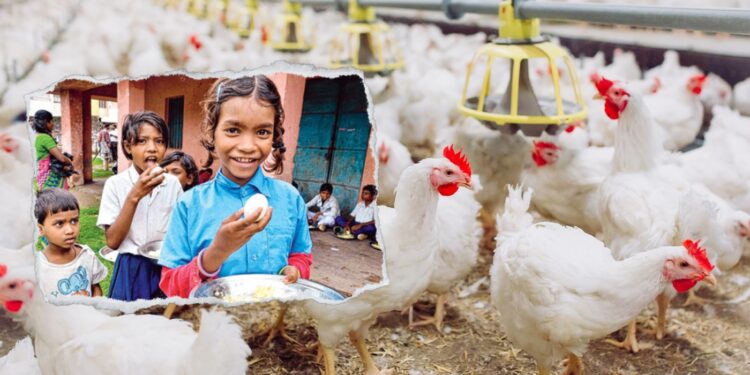On March 11, 2025, Bihar government officials swiftly removed eggs as part of the dietary menu in more than 70000 Publicly funded schools during a short period of time. Bihar executed this fast decision because bird flu (also known as avian influenza (H5N1)) spread more firmly across the state and confirmed its presence in three locations including Patna and Bhagalpur and Jehanabad. This substitution of eggs with seasonal fruits in mid-day meal programs affects 10 million students who depend on daily school feeding services while creating multiple concerns about their nutrition needs and the crisis management capabilities of the state.
The story extends beyond viral infection as it reveals how fast decisions were made along with important signs missed while institutions fought to protect both public wellness and the basic needs of weak community members. You will encounter the developing bird flu crisis in Bihar while exploring its aftermath from removing eggs from school student plates.
The Bird Flu Crisis Unfolds in Bihar
It started quietly enough. The Indian Council of Agriculture Research (ICAR) premises in Patna experienced fatal incidents affecting chickens on February 27, 2025. The National Institute of High Security Animal Diseases in Bhopal received samples which found H5N1 bird flu infection. The virus extended its reach to Bhagalpur and Jehanabad during early March as it killed both crows and poultry. The state which already fought against poverty and malnutrition became exposed to a dual public health crisis affecting its poultry business and human population.
Data paints a grim picture. The Mid-Day Meal scheme of Bihar operates as one of India’s biggest programs by supplying 70,202 educational institutions that distribute daily meals to 10 million recipient children on average. Every week the Mid-Day Meal scheme provides eggs to students in Classes 1 to 8 because they serve as an essential protein source that benefits children who belong to low-income households especially. The health crisis emerged when authorities confirmed bird flu allowing them to act speedily although critics believe this was after the optimal period for prevention.
| Key Statistics | Details |
|---|---|
| Schools Affected | 70,202 |
| Children Impacted Daily | 10 million |
| Egg Distribution Day | Every Friday |
| Districts with Confirmed Cases | Patna, Bhagalpur, Jehanabad |
Eggs Off the Menu: A Hasty Decision or Prudent Move?
The Federation took the decision to eliminate eggs from the Mid-Day Meal program on March 11th 2025 right after confirming the Patna outbreak. The Bihar government presented its egg removal order through protecting public health by substituting fruits such as apples or bananas instead of eggs for non-vegetarian students (vegetarian students already received fruits). Health Minister Mangal Pandey notified the citizens that his department was actively tracking the disease while asking people to maintain a composed state.
But was this enough? Nutrition experts state that eggs offer 6 grams of nutritious protein while a single portion of fruit barely matches their protein content. The dietary change threatens to increase the nutritional difficulties that already affect these children. Dr. Anil Kumar a pediatric expert in the region confirmed that eggs were included in the MDM to enhance its health benefits. The abrupt withdrawal of eggs from the mid-day meal program jeopardizes the steady increase of nutritional benefits made over multiple years.
State government negligence becomes evident through this decision. Experts have identified faults in poultry farm biosecurity practices as the main reason why the virus escaped control and spread without oversight. The first step in H5N1 containment depends on wildlife monitoring at the farm level according to veterinarian Dr. Priya Sharma. Bihar shows an unplanful response without utilizing any proactive measures.
Measures Taken: Too Little, Too Late?
The state administration has taken rapid action to control the bird flu epidemic through various steps.
- Culling Operations: The authorities executed culling procedures against chickens and ducks that existed within a one kilometer range from infected areas across Patna Bhagalpur and Jehanabad. The destruction of hundreds of birds had taken place by March 9.
- Health Monitoring: Health Department personnel delivered notifications to healthcare institutions requesting flu-related symptom surveillance among patients without confirming any human transmission of the virus.
- Zoo Precautions: To protect the birds at Sanjay Gandhi Jaivik Udyan the administration of the zoo used insecticides in the areas surrounding the cages.
- Public Appeals: The government sent a message to residents that cooked poultry poses no safety risks given that the World Health Organization confirmed this position.
These steps reveal major shortcomings in the system. The system intended to provide early alerts should have been activated. The authorities should have conducted biosecurity audits on poultry farms before the outbreak developed. Jharkhand took immediate action toward culling operations because Bihar demonstrated a delay in response according to evidence. The public expresses their dissatisfaction through X posts when they ask why proper planning failed during the bird flu crisis.
State Government Lacunas: A System Under Scrutiny
Systemic flaws emerge through the bird flu outbreak which occurred in Bihar. Here’s where the state faltered:
- Delayed Detection: The Patna officials registered their first fatalities on February 27 yet it necessitated a week to approve the cause of death. The disease would have been more effectively controlled through rapid testing measures.
- Inadequate Biosecurity: The mandatory biosecurity checks which protect poultry farms are insufficient in rural areas. Many Bihar poultry farms lack the protective features described in the biosecurity guidelines issued by the USDA.
- Nutrition Oversight: The state lacks an established method to compensate for protein deficiency which occurs because of egg removal. The nutritional properties of fruits do not reach the same level as eggs.
A table sums up the gaps:
| Issue | State Response | Criticism |
|---|---|---|
| Detection Speed | Confirmed March 8 | Too slow—lost critical containment time |
| Farm Biosecurity | No prior audits | Allowed virus to spread unchecked |
| Nutritional Replacement | Seasonal fruits | Inadequate protein substitute |
The Road Ahead: Can Bihar Recover?
Bird flu has not ended as of March 13th 2025. The continuous culling process persists alongside the total exclusion of eggs from MDM school meals services until government officials declare “normalization” of the situation. A solid plan appears essential to achieving normalization because the current situation remains distant. It is the duty of the government to enhance surveillance efforts while enforcing farm rules and providing fortified meals as part of nutritional alternatives to protect children’s health..
For now, Bihar’s schoolchildren munch on fruit instead of eggs, a small but telling shift in a state battling bigger woes. The H5N1 outbreak serves both as an alarming health threat that should not be underestimated. Does the authority response to this situation show attention or does the ongoing neglect permit the virus along with its consequences to stay persistent?
Additional information about bird flu safety is available through the FDA’s official guidelines. Bihar should move forward with vigilance and hope for a brighter chapter of strength instead of returning to past mistakes.
Subscribe to “The Raguel” for more updates and news.



































